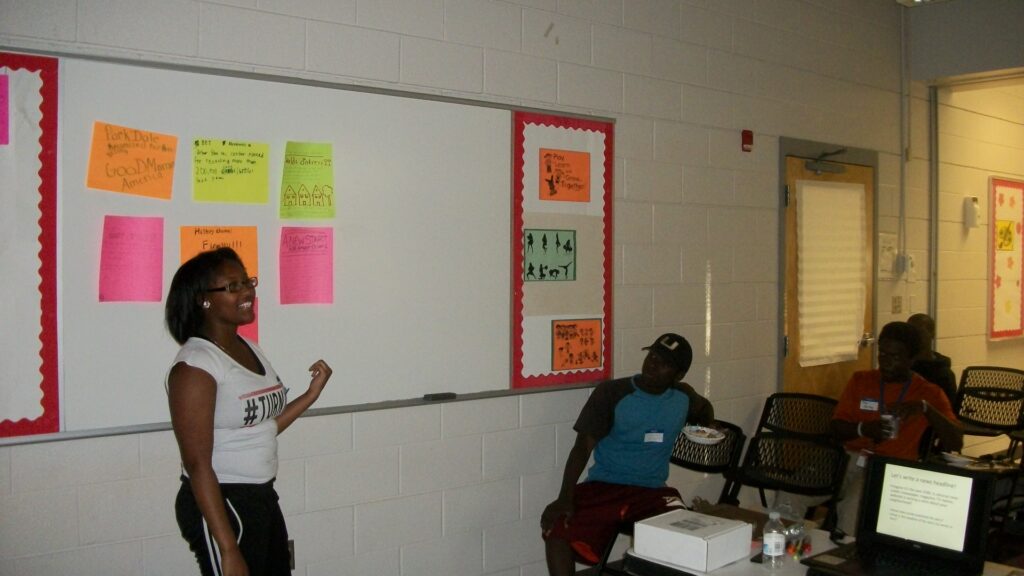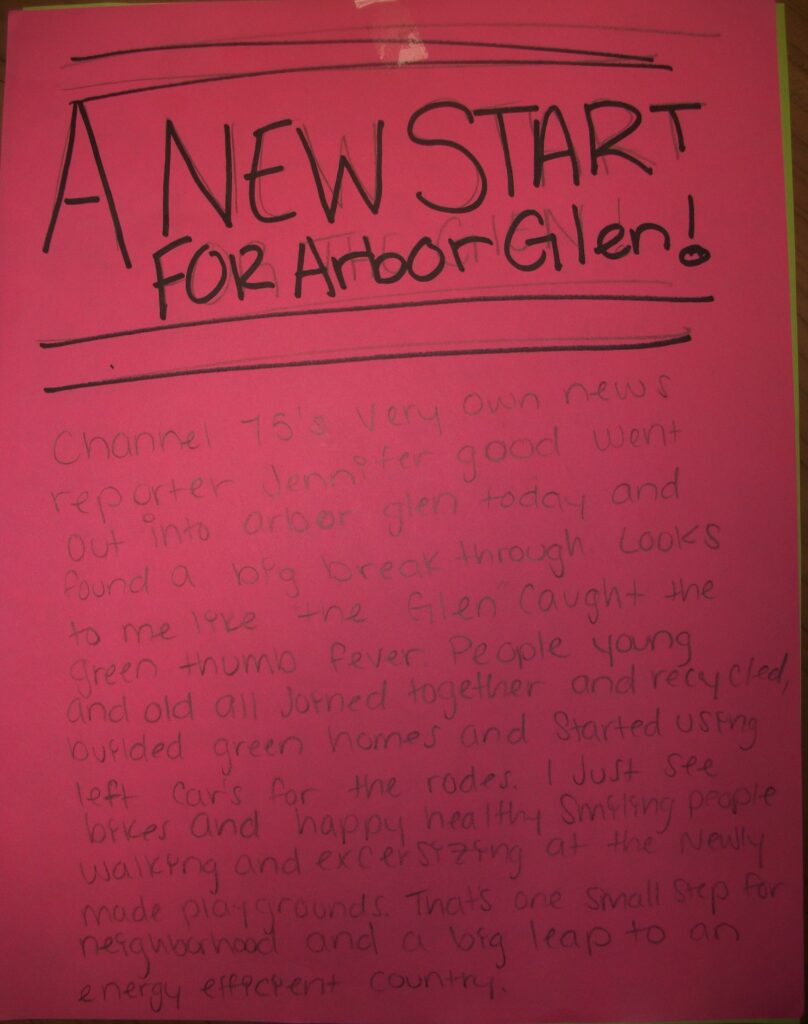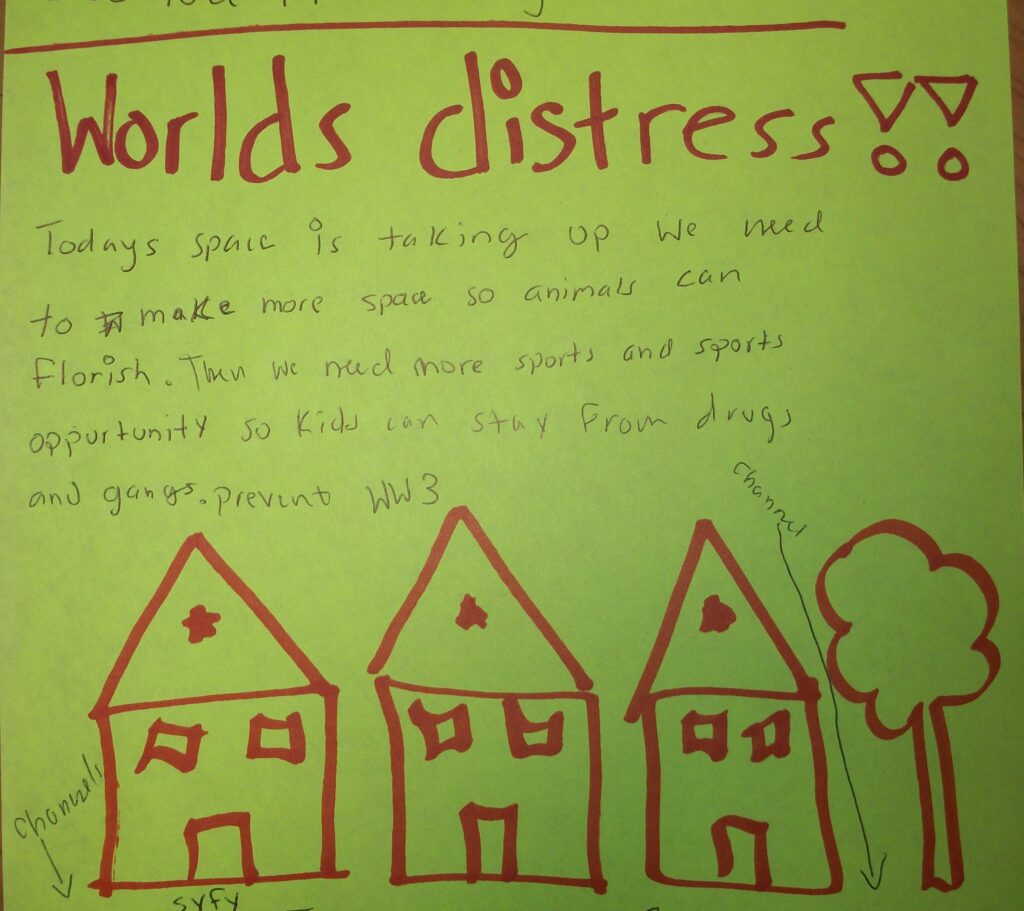West Boulevard youth envision a sustainable community
“People young and old all joined together and recycled, built green homes and started using less cars for the roads. I just see bikes and happy healthy smiling people walking and exercising at all the newly made playgrounds. That’s one small step for a neighborhood and a big leap to an energy efficient country”. This is the vision 17 year-old Imani created for her Arbor Glen neighborhood in the year 2040. It’s a powerful vision, and it’s achievable. In fact, we loved this vision so much that we read it aloud to Mecklenburg County state legislators the following morning!
On April 23, middle and high school students in Charlotte’s West Boulevard neighborhoods joined Sustain Charlotte’s staff (Branyn Calegar and Meg Fencil) for a sustainability visioning workshop at the Arbor Glen Outreach Center.
Youth created and shared 2040 neighborhood visions with their neighbors.
We began by asking a simple question: “How would you define sustainability?” All of the youth said they’ve heard this word before, but their answers showed that they didn’t have a firm understanding of it:
“I would define sustainability as in controlling something.”
“Maintaining the same in the neighborhood.”
And my personal favorite: “By using a dictionary”
By the end of the workshop, they answered the same question much more accurately:
“Meeting our needs for today, so that we will meet our needs for the future.”
“The ability to do something now and not hurt the future.”
“Helping one another to change from the past to future, moving together as one unit.”
We educated the participants about Charlotte’s current sustainability challenges related to water, waste, land use, transportation, food availability, and energy. And they educated us. Compared to some of the more moderate-income neighborhoods where we’ve hosted similar workshops, many West Boulevard neighborhoods struggle with critical social sustainability issues including high rates of both property and violent crime, homelessness, low educational attainment, and high resident turnover.
Sustainability challenges can’t be compartmentalized into neat and tidy categories. The residents explained how food availability, transportation, land use, and public safety are interrelated for them. Ms. Dorothy, a community elder who attended the workshop, told us that she remembers past decades when many homes had gardens. “There’s just lawns now, not gardens. Now you have to ride on the bus to go buy food, but it’s not safe to walk home alone from the bus stop after dark.” A Reid Park Academy middle school student told us that he wouldn’t feel safe riding his bike in parts of the neighborhood because someone might take it from him.

An impressive variety of neighborhood 2040 visions were created by workshop participants.
Our project goal is to build long-term social equity, improved environmental health, and economic opportunity by empowering residents to become knowledgeable and passionate sustainability leaders within their neighborhoods. Working with youth is especially impactful because they are eager to learn, enjoy working together, and aren’t afraid to work towards bold visions that adults might dismiss as unlikely.
Youth benefit from greater community engagement in ways that transcend the immediate impact of their work. Confidence and self-determination will be gained through the process of organizing and implementing their own project. When we suggested that they should invite local elected officials and media to cover their project, they were both surprised and excited. Sustain Charlotte will provide an opportunity for them to engage in the broader community and make sure that their neighborhood is noticed by the media for all the right reasons.
We asked each participant to write their vision for how they want their neighborhood to look 25 years from now, in the year 2040. There was some shaking of heads and sheer disbelief from one 16 year-old who said, “Woah, I’ll be…an old man then!” But once they started writing, their creativity and exuberance quickly spilled onto the brightly colored paper.

17 year-old Imani’s vision for Arbor Glen in 2040.

Joshua envisions more open space, recreational opportunities, and peace for his neighborhood.We told the youth that we’re not fond of the term “Future Leader”. Because these youth are already leaders. By willingly giving up an hour and a half of their free time to actively participate in shaping the future of their neighborhoods, they are working in a very practical way to improve the quality of life for themselves and others. Whatever career paths they choose, our hope is that this experience will help them to consider sustainability in the decisions they make throughout their personal, civic, and professional lives. Ty, a junior at Harding University High School who aspires to become a chemical engineer, eagerly asked me how I found my career path in sustainability. He ended our conversation by saying, “Ms. Meg, you have the best job in the world!”. I couldn’t agree more.
What’s next for Sustain Charlotte and these residents? We’re returning on May 21 to facilitate an implementation workshop. This is when the real work will begin, as they choose exactly what sustainability projects to pursue based on the needs they identified at the first workshop. Throughout the rest of the year, they’ll plan and implement their projects in the West Boulevard community. With such a bright and enthusiastic neighborhood sustainability team, we can’t wait to see how they begin transforming their community!
Sustain Charlotte’s work with the West Boulevard community is funded by grants from the Wells Fargo Regional Foundation, UTC Aerospace Systems, New Belgium Brewing, and operating support grants from the Z. Smith Reynolds Foundation and Park Foundation. Mecklenburg County Park & Recreation is partnering with us by providing meeting facilities, staff expertise and planning assistance, and promotion of workshops.
If you or your organization are interested in learning more about how to support our neighborhood work in low-income communities throughout Charlotte, please contact our Education and Outreach Program Director, Meg Fencil, at [email protected].
Thanks for reading!
As a nonprofit, community support is essential for us to keep doing what we do — including providing free articles like this. If you found this article helpful, please consider supporting Sustain Charlotte.
Want to stay in the loop? Subscribe to our weekly newsletter and follow us on Instagram, Facebook, and Twitter.

